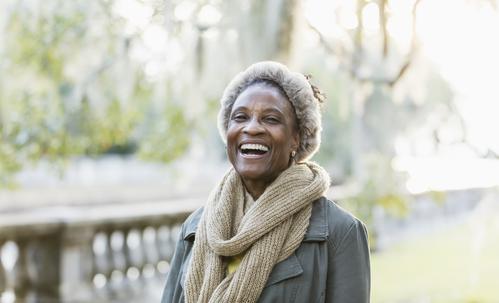
Older people lose body heat quickly and much faster than when they were young. Changes in the body that come with aging make it harder for older adults to be aware they are getting cold. Cold weather can turn into a dangerous health risk before an older person understands what is happening, and this can result in hypothermia.
According to the National Institute on Aging, hypothermia occurs when your body temperature gets very low. For an older person, a body temperature of 95°F or lower can cause many health problems, such as a heart attack, kidney problems, liver damage, or worse. Being outside in the cold, or even being in a very cold house, can even cause hypothermia. Here is how to protect yourself.
1) Bundle Up When Going Outside
Dress for the weather if you must go outdoors on chilly, cold, or damp days. First, be sure to wear loose layers of clothing. The air between the layers helps to keep you warm and comfortable. Always wear a hat and scarf outdoors, because you lose a lot of body heat when your head and neck are uncovered.
2) Keep Your Medical Appointments
Some health conditions can make it harder for your body to stay warm on its own. For example, thyroid problems might make it difficult to maintain your normal body temperature. Diabetes can cause problems with your circulation, which helps your body feel warm. Parkinson's disease and arthritis can make it hard to dress properly. Memory loss or dementia can cause a person to go outside without proper clothing. Keep all appointments with your doctor so you can stay healthy and manage any health conditions you have.
3) Manage Cold, Winter Weather
To avoid hypothermia, it’s important to take precautions when you have snow, ice, or any severe weather. Don’t attempt to shovel the driveway on your own. Hire someone to shovel or plow your driveway so that you don’t have to expose yourself to the cold. If you must go outside, wear a waterproof coat, a hat, gloves, and boots. Having cold feet and hands cause you to lose body heat.
4) Know the Forecast
Heavy winds, rain, and severe weather can quickly lower your body temperature. Check the weather forecast before you head outside so that you are properly dressed. If you get wet or cold outside, always change into warm, dry clothing immediately. Bring a cell phone with you whenever you are outside in case you need to call for help.
5) Weather-Proof Your Home
Part of staying warm is making sure your house isn't losing heat through windows and doors. Keep your blinds and curtains closed. If you have gaps around the windows or doors, use weather stripping or draft stoppers so that the house stays warm. Wear warm clothes even if you are staying in the house. Use extra blankets and always wear socks and slippers. If you’re cold at night, wear long underwear and use an extra blanket in your bed. If a power outage occurs and you have no heat, stay with friends or family members. Don’t stay in the house without any heat.
If you can’t afford your heating bills, help may be available. Call the National Energy Assistance Referral service at (866) 674-6327 to request assistance. You can also learn more about energy assistance at the National Council on Aging’s website: https://www.ncoa.org/article/energy-assistance-benefits.